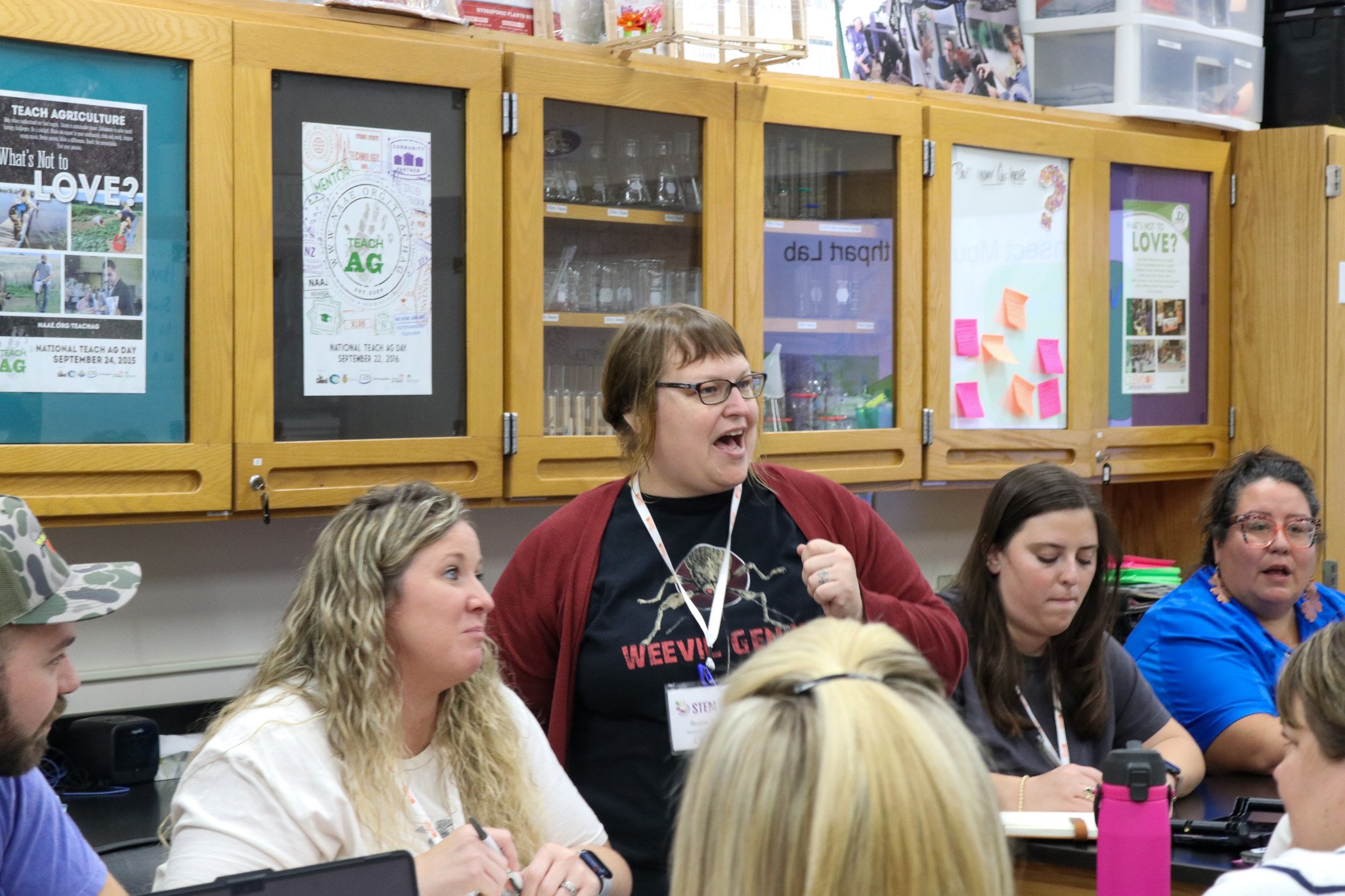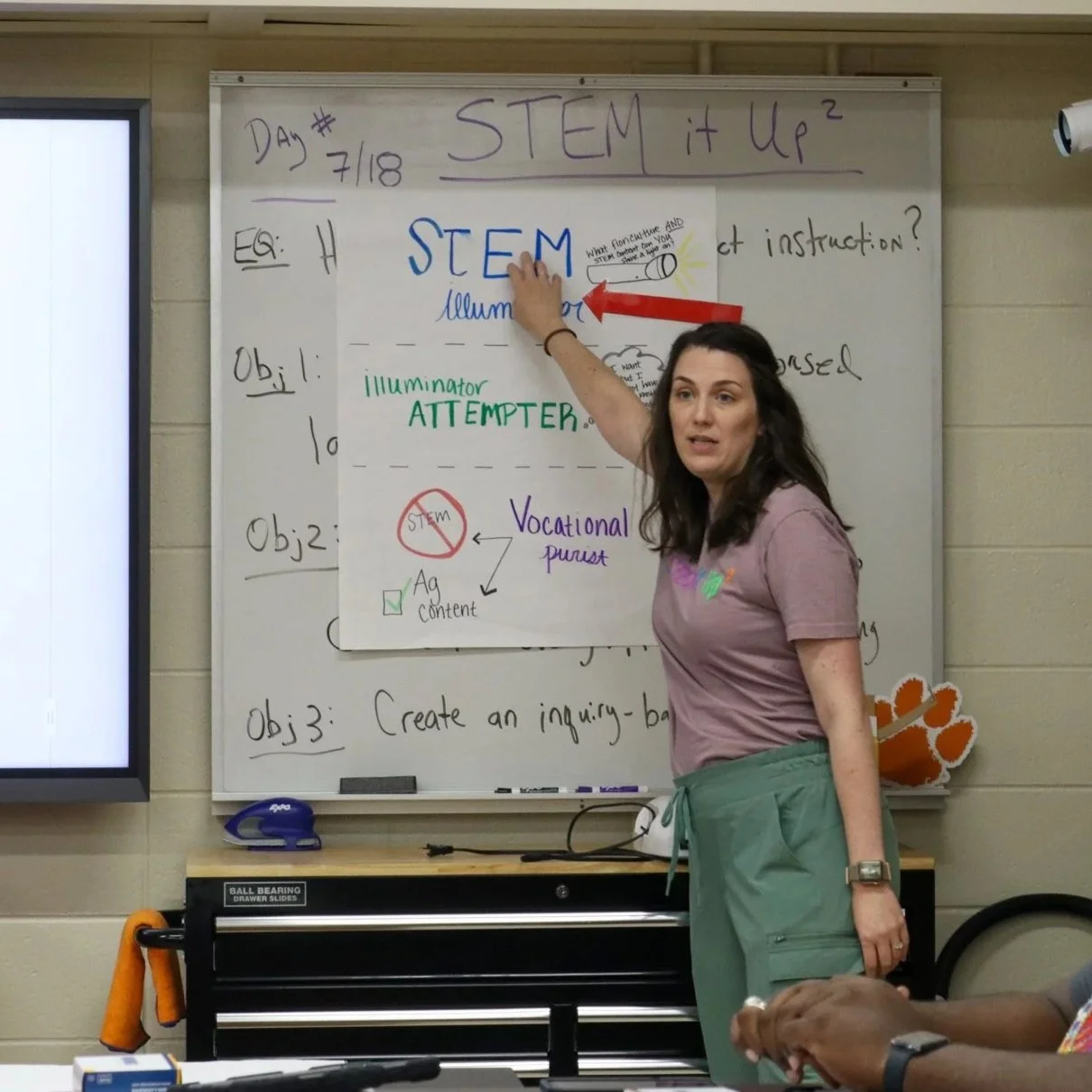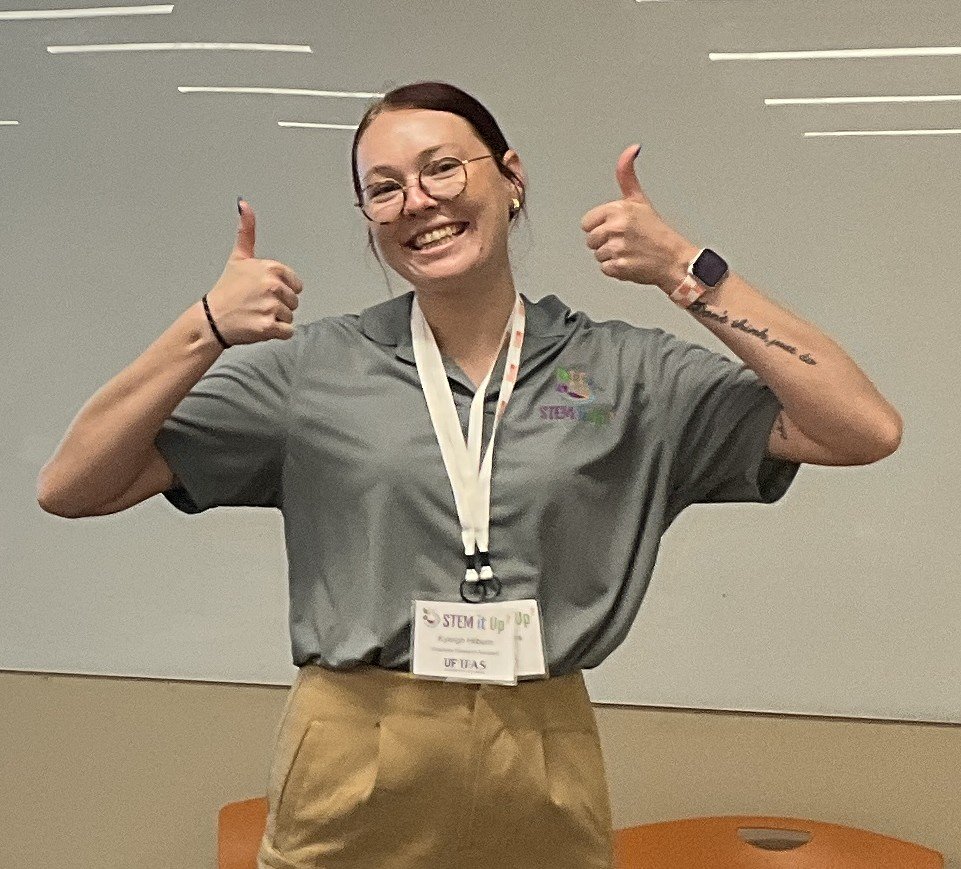Meet the Team
-
Program Director - Clemson University
Before joining the Agricultural Sciences Department in the Agricultural Education Program at Clemson University, Catherine spent several years working in various facets of the ornamental horticulture industry and seven years as an agriscience teacher and FFA Advisor at Caesar Rodney High School in her home state of Delaware. She is a two-time graduate of the University of Delaware with a B.S. degree in Plant Science with a concentration in Ornamental Horticulture and a Master's degree in Instruction. She completed her Ph.D at the University of Florida. Throughout the nation, Catherine works with and designs professional development for pre-service and in-service agriscience teachers to assist with curriculum development focused on STEM integration using inquiry-based instruction methods, aligning with her research agenda. Her research focuses on identifing the knowledge, skills, and dispositions needed for career readiness to prepare students for the 21st-century workforce.
Her position in the Agricultural Education Program is focused on teaching in the areas of instructional methods, curriculum design, and teaching in agriscience laboratories. She also serves as the undergraduate program coordinator for the Agricultural Education Program and Agricultural Education Teaching Certificate Program. She is very passionate about advising, mentoring, and working with pre-service teachers to prepare them to be effective instructors in successful school-based agricultural education programs. She serves as an active member of the CAFLS Teaching and Learning committee and enjoys mentoring colleagues to help improve their teaching effectiveness. Creation of the STEM it Up program intersects her expertise in industry and education.
-
University of Florida
Dr. Brian Myers was raised on a grain and livestock farm in west-central Illinois. He received his BS and MS degrees in Agricultural Education from Southern Illinois University at Carbondale. Myers taught high school agriscience at Unity High School in Mendon, IL, for four years prior to beginning his doctoral studies.
He joined the AEC faculty in 2004 as a teacher educator. In 2016, Dr. Myers was appointed chair of the department. His research interests include: Agriscience Curriculum Development and Implementation, Connecting Research to Practice, and the Design and Delivery of Professional Development. Dr. Myers has advised over 45 graduate students (MS & PhD) and served on the supervisory committee for dozens more. He has authored or co-authored over 125 refereed journal articles and conference papers.
As an author or co-author, Dr. Myers has received outstanding article or paper presentation awards at the regional or national levels on 18 different occasions. He is a co-founder of Owl Pellets: Tips for Ag Teachers, a social media-based program to translate research-based findings in agricultural education into practical applications for educational practitioners. He also serves as the coordinator for LEAD IFAS, a professional development program for IFAS faculty and staff focused on developing the leadership skills of current and future leaders in IFAS.
Overall, Dr. Myers’ work is guided by the mission to develop passionate educators equipped with the knowledge, skills, and desire to make a positive difference in the lives of students.
-
Michigan State
Aaron McKim is an Associate Professor in the Department of Community Sustainability. Aaron’s research focuses on the facilitation of interdisciplinary learning spaces within the context of agriculture, food, and natural resources (AFNR) education. In this work, Aaron explores the role educators, both formal and non-formal, play in making connections between AFNR and science, mathematics, leadership, and engineering. This work is compelled by the critical need to prepare individuals to think outside traditional disciplinary boundaries to solve complex problems at the nexus of social and ecological interactions. Aaron is establishing a portfolio of funded projects, with current work funded by the United States Department of Agriculture (USDA), National Science Foundation (NSF), and Michigan Department of Education (MDE). His research helps to inform his teaching in AFNR education, which includes a preservice teacher education course focused on program planning (i.e., TE 408). In addition to his work in AFNR education, Aaron has a passion for research and teaching within leadership. Aaron’s leadership research seeks to challenge traditional notions of leadership being influence, linear change, and organization and replace, instead, the concept of leadership for sustainability. Leadership for sustainability suggests all members of a system are responsible for guiding that system toward ecological, economic, and social sustainability; thus, the act of leadership being the responsibility of an identified “leader” is challenged. In this scholarship, Aaron positions leadership for sustainability as a required way of thinking to address the increasingly complex and consequential challenges faced by society. Leadership for sustainability presents an exciting opportunity to shape conversations about research and practice related to leadership for many years to come. Aaron’s scholarship on leadership for sustainability guides his teaching of a leadership for sustainability course.
-
Graduate Research Assistant, Curriculum and Instruction - Clemson University
Rustie graduated from Bradley University in Peoria, Illinois, in 2001, with a Bachelor of Science in Biology. In 2007, Rustie moved to Colorado to attend Colorado State University to study Horticulture and Entomology. While working in the labs and greenhouses there, she decided to pursue teaching. In 2010, she obtained a Master of Education Degree with teaching licensure from Colorado State University, focusing on science education. In 2010, Rustie began teaching middle and high school and concurrent enrollment science and agriculture courses. She has 14 years of classroom experience. In 2022, she pursued an additional graduate degree and obtained a Master of Science in Biology Education. Rustie is currently seeking a Doctor of Philosophy in Agricultural Education.
-
Program Co-Director - Virginia Tech
Originally from Dallas, Texas, Natalie graduated with a Ph.D. from the University of Florida in the Department of Agricultural Education and Communication, specializing in agricultural teacher education. Her dissertation explored teachers' behaviors and attitudes towards integrating science in their courses, students' motivation to learn science in agriculture, and the impacts of science integration on students' content and technical knowledge. She completed her undergraduate degree at Texas Tech University in Horticulture and Turf Grass Science and her Masters of Agricultural Leadership at the University of Georgia. Before returning to school to pursue her Ph.D., she taught high school agriculture in central Georgia and east Texas. Her research agenda focuses on science within school-based agricultural education (SBAE), teacher professional development, teacher self-efficacy, experiences of pre-service teachers, and gender stereotypes of agricultural careers.
-
Florida
Kyleigh is a Ph.D. candidate at the University of Florida.







